The Leiden American Pilgrim Museum Foundation is involved in several academic projects relating to the history of the Pilgrims in The Netherlands and the United States of America.
The museum carries out and presents historical research through writing books and articles (in part but not only using transcribed raw material), presenting lectures, and attending conferences. You will find here some of our publications, as well as some helpful resources.
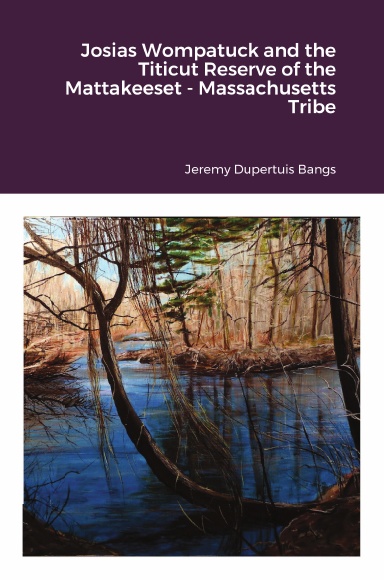
Josias Wompatuck and the Titicut Reserve if the Mattakeeset – Massachusetts Tribe (New edition)
by Jeremy Bangs, 2020
Josias Wompatuck and the Titicut Reserve of the Mattakeeset - Massachusetts Tribe contradicts recent claims that the Titicut Reserve was historically "Wampanoag" territory; instead presenting the historical evidence that the Titicut Reserve was established by Josias Wompatuck in the seventeenth century to remain perpetually a possession of the Mattakeeset Massachusetts Indians. An Addendum ("Mashpee Assertions") in this second edition disputes the claims advanced in the 2012 submission by which the Mashpee Wampanoags assert claims to the Titicut Reserve.
Get the book here
A NOTE ON THE SECOND EDITION: The Addendum (“Mashpee’s Assertions”) responds to questions from two of the book’s initial readers: What did the author think of the material submitted by Mashpee Wampanoags to justify their claim to the Titicut Reserve? Were there two sachems of Nemasket – Tuspaquin “the Black Sachem of Nemasket” and Josias Wompatuck? The Addendum provides answers. A third questioner wondered why the author had not included information about Pocasset Indians. It was originally thought that there was no information about them related to the book’s focus, but on reconsideration hints of an important topic for further research in later documents were found. A Plymouth Court Order dated December 1, 1640, and renewed on June 3, 1668, set aside Pokanoket, Sowams, and Causumpsit “or any other such neckes or tracts of land as there is a body of Indians upon” as land reserved permanently for Indian possession, a status rescinded after King Philip’s War, when most of the land was confiscated to be sold to cover war costs. In 1676, Josiah Winslow specified Pocasset as among the land that had been reserved. Land on the south side of Pocasset Neck was described on 7 July, 1681, as bordering the “Christian Indians land” – which implies the ongoing existence of a reserve otherwise not showing up in documents used here (and also not included in Richard W. Cogley’s John Eliot’s Mission to the Indians before King Philip’s War (1999)). See the book Indian Deeds (2002, 2008) by Jeremy Bangs, pp. 22, 391, 531.
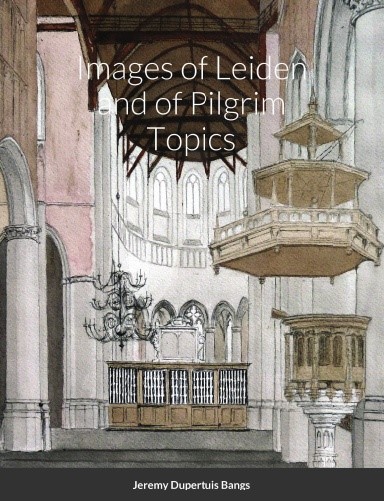
Images of Leiden and of Pilgrim Topics
by Jeremy Bangs, 2020
More than fifty drawings and paintings of Leiden and of Pilgrim topics, dating from 1968 to 2020, by Jeremy Bangs, Director of the Leiden American Pilgrim Museum, are presented in this volume.
Get the book here
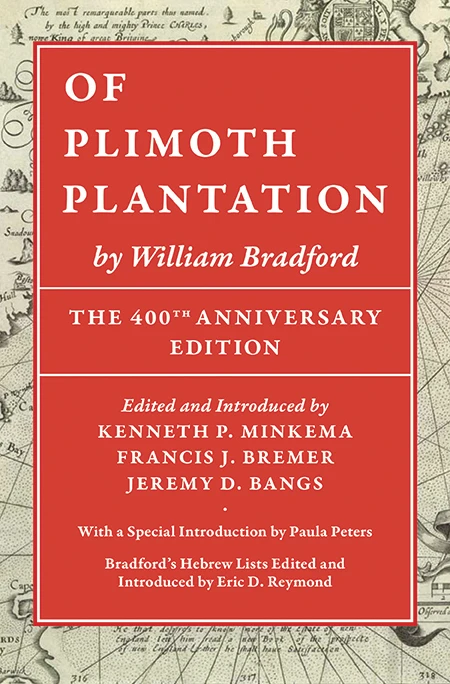
Of Plimoth Plantation by William Bradford
The 400th Anniversary Edition
by Kenneth P. Minkema, Francis J. Bremer, and Jeremy D. Bangs. Special Introduction by Paula Peters. Bradford’s Hebrew Lists Edited and Introduced by Eric D. Reymond. The Colonial Society of Massachusetts and NEHGS, 2020
This edition of Bradford's famous history is presented as part of the observation of the 400th anniversary of the founding of Plimoth Colony in 1620.
Made from a new transcription of the original manuscript, with annotations that incorporate recent information and interpretations, this version of Bradford's magnum opus includes an introduction that brings together Native and non-Native commentators as well as an appendix that presents Bradford's later Hebrew exercises.
Get the book here
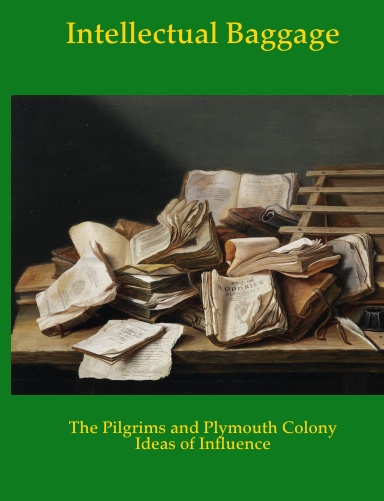
Intellectual Baggage Catalogue
by Jeremy Bangs, 2020
Intellectual Baggage is the catalogue of an imaginary exhibition of more than 50 books the Pilgrims owned and read. These books reveal to us the ideas that influenced the Pilgrims' understanding of their lives and their surroundings.
Essays by Jeremy Bangs, Frank Bremer, David Furlow, David Lupher, and Sarah Moine illuminate the history of the Pilgrims, their religion, their culture, and their lives with books. Catalogue entries by Jeremy Bangs, Donna Curtin, Connor Gaudet, and Sarah Moine examine particular books owned and read by William Brewster, William Bradford, Myles Standish, and other Pilgrims.
Get the book here
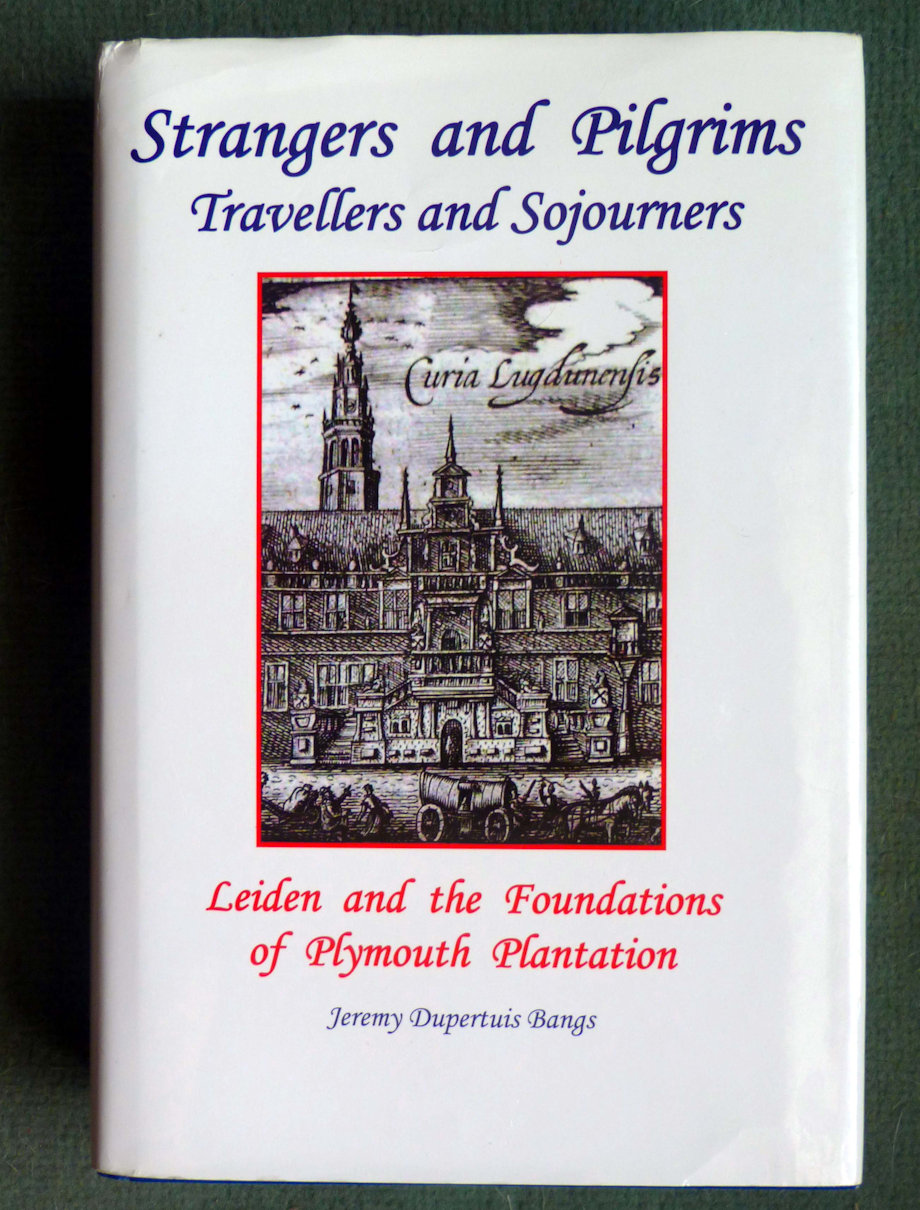
Strangers and Pilgrims
by Jeremy Bangs
In 2009, Jeremy Bangs' new history of the Pilgrims in Leiden appeared, marking the 400th anniversary of the Pilgrims' arrival in Leiden in 1609. Now in its second printing, Strangers and Pilgrims, Travellers and Sojourners - Leiden and the Foundations of Plymouth Plantation can be ordered from the publisher - The General Society of Mayflower Descendants, in Plymouth, Massachusetts.
Strangers and Pilgrims thoroughly revises our views of the origins and development of the Pilgrim adventure; and the book shows how their Leiden exile influenced the new society the Pilgrims created in Plymouth Colony. Read what people are saying:
"It is hard to adequately express the importance of this massive volume, the life work of a singularly gifted historian whose profound knowledge of Puritan theology and historic art and architecture, coupled with an unprecedented mastery (by a writer in English) of Dutch sources, enabled him to compose this unsurpassed in-depth analysis and description of the Dutch context of the Pilgrim experience. Unlike Philbrick’s more popular treatment, Bangs’ work is not a “quick read,” although his style and acerbic humor make it far more accessible than standard academic stodge. It is, however, the answer to the prayers of anyone seriously interested in the life and times of the Pilgrims, and especially of their formative sojourn in the Netherlands, as well as in England and America. It effectively supersedes the Dexters’ England and Holland of the Pilgrims (1905), previously the major source for the Dutch experience, and its extensive digressions – often comprehensive theses in themselves – fully elucidate the doctrines, politics, and culture of the era in which the Pilgrims were actors."
"For an encyclopedic treatment of the Pilgrims' experience in Leiden before migrating to Plymouth, you might peruse Jeremy D. Bangs, Strangers and Pilgrims, Travellers and Sojourners: Leiden and the Foundations ofPlymouth Plantation (Plymouth, MA, 2009), but know that the author is openly contemptuous of the Pilgrims' religious beliefs."
"In this incredible work Jeremy Bangs rips away nearly four centuries of encrusted knowledge about the Pilgrims. Not content to rely on 'received knowledge' about this separatist community, Bangs has spent a lifetime searching them out in archives - Dutch, English and American. The result is an extrordinary reassessment of these people. Never mincing words (Bangs is refreshingly direct), his scholarship is the starting line for any historian interested in the Pilgrim story or early American history writ large. The bibliography alone (107 pages) is worth whatever price this book carries. Forget what you think you know about the Pilgrims. Read Bangs!"
"No one knows more about the Pilgrims than Jeremy Bangs. This exhaustive study is a rich trove for those seeking to learn more about their lives and thoughts in England, the Netherlands, and America."
"A summary of the main emphases of this exceptional study cannot do justice to Bangs's superb achievement. This book translates for experts and lay readers alike the gnarled points of Calvinist and Catholic polemics in Amsterdam and Leiden; the grand national struggle among Hapsburg Spain, Jacobean England, and Holland; and the plight and destitution of commoners in their quest for freedom of conscience in the Low Countries and ultimately in New England. Bangs brings to the discussion an abundance of new material ... reconstructs the challenges of everyday life within the walls of Leiden: the demands on families to live in crowded hovels and cook meals in cumbersome fireplaces, to compete in new trades with Dutch artisans, to rear children in their evolving Separatist faith, to negotiate the purchase and sale of dwellings and the use of church buildings, and to participate in an unfamiliar social and political environment. ... a fascinating, even suspenseful, tale. Bangs strips away layers of images and assumptions constucting the Pilgrims as mere effigies of our own unrealized fears and aspirations, allowing them to finally emerge as people of flesh and blood."
“Bangs' study of the Pilgrims' experience in Holland is an invaluable addition to the scholarly literature. He not only reviews what is already known (albeit much of it published only piecemeal) but brings new findings and fresh insights. Bangs' book reinforces the significance of the years spent by the Pilgrim leadership in Leiden and will be a fascinating eye-opener for Mayflower descendants and American history enthusiasts alike."
"Strangers and Pilgrims" is an absorbing and compelling combination of intellectural history and vivid writing. Dr. Jeremy Bangs has given us another splendid chronicle of Pilgrim history."
A review of Strangers and Pilgrims by Stacy Wood is published online at: http://www.sail1620.org/history/articles/142-review-strangers-pilgrims.html
To order the book, call: (508) 746-5058 or get the book here
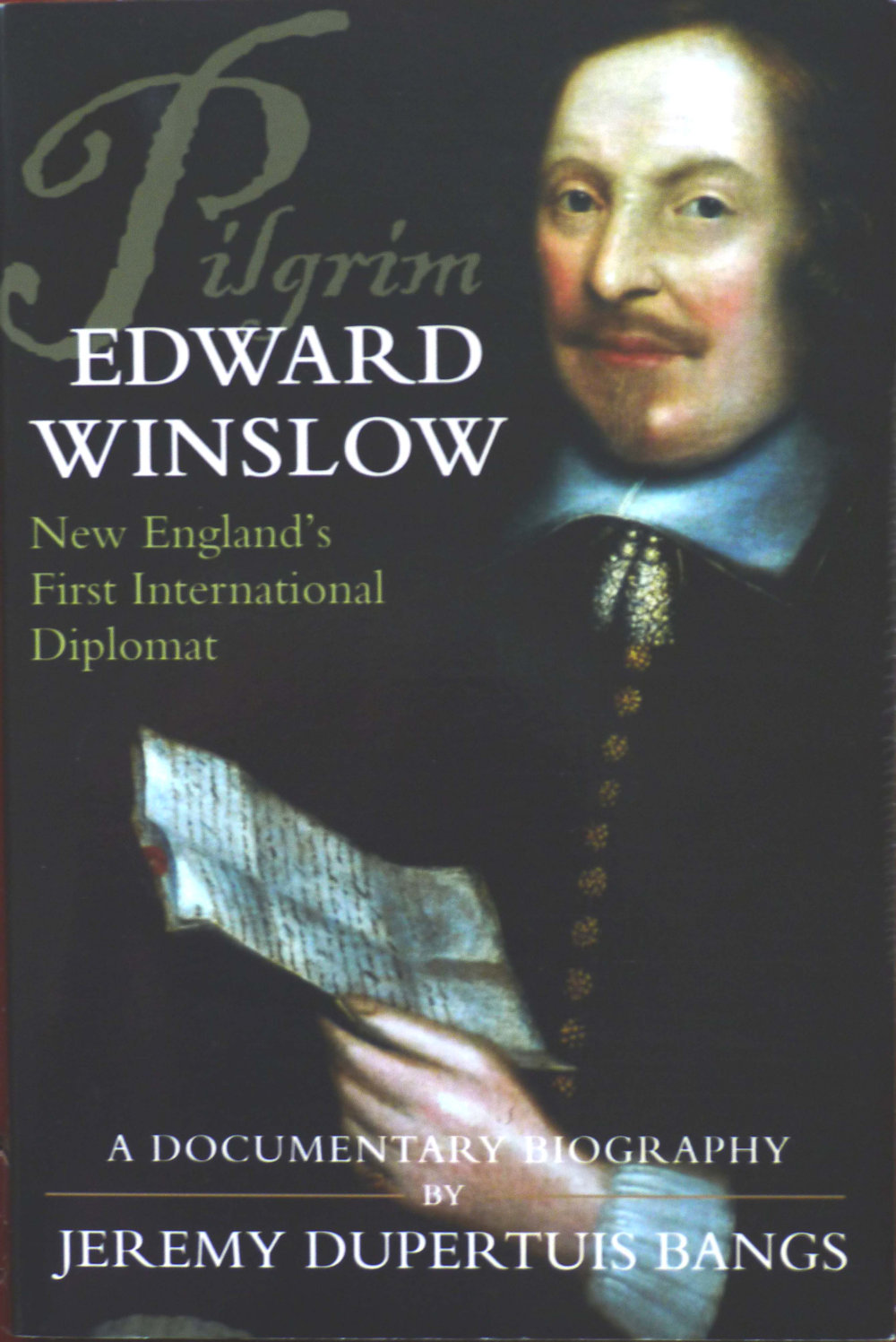
Pilgrim Edward Winslow
New England's First International Diplomat
by Jeremy Bangs
Pilgrim Edward Winslow, New England's First International Diplomat. In 1995-1996 heb ik de 17e-eeuwse manuscripten getranscribeerd in de collecties van The Pilgrim Society (Pilgrim Hall Museum). Een van de documenten die het meest interessant was, was het diploma van Edward Winslow, waarin werd vermeld dat Oliver Cromwell en de Nederlandse Staten-Generaal (parlement) Winslow hadden benoemd tot lid van een internationale arbitragecommissie om openstaande verschillen tussen Engeland en Nederland op te lossen na de eerste Engels-Nederlandse Oorlog (een arbitragecommissie opgericht door het Verdrag van Westminster, 1654).
Winslows diploma suggereerde dat documentatie over dit onbekende deel van zijn carrière in de Nederlandse en Engelse archieven te verwachten was. De schat aan nieuwe informatie die ik ontdekte in Londen en Den Haag kreeg vorm in een volledige biografie (NEHGS, 2004). Winslow's carrière als regeringsfunctionaris en agent voor de kolonie verandert het verhaal van zijn leven in een geschiedenis van de kolonie en haar financiën (tot aan zijn dood in 1655). Winslow was betrokken bij de betrekkingen van Plymouth Colony met indianen en met de naburige koloniën voordat hij in 1646 terugkeerde naar Engeland, waar hij de belangen van New England in de Cromwelliaanse regering vertegenwoordigde. Naast zijn leiderschap (in Londen) bij de oprichting van de Society for the Propagation of the Gospel in New England, was hij lid van verschillende hoge overheidscommissies, en werd hij ook benoemd tot rechter bij de High Court. Winslow stierf aan boord van een schip voor Jamaica in 1655, waar hij was gestuurd om de burgerregering te leiden waarvan de Engelsen verwachtten dat ze zich daar zouden vestigen bij de verovering van het eiland.
De biografie van Winslow biedt een gedetailleerde studie van de financiën en politieke betrekkingen van de kolonie, waardoor Plymouth Colony midden in een levendige Atlantische wereld van handel en migratie wordt geplaatst. Winslow werd 140 jaar vóór het Jay-verdrag (1794), dat ten onrechte wordt beschouwd als het begin van de moderne internationale arbitrage, gekozen voor baanbrekend werk in internationale arbitrage. De rol van Winslow in de Engelse regering weerspiegelt niet alleen zijn roem persoonlijk, maar ook de betekenis van Plymouth Colony in de schatting van overheidsfunctionarissen in Engeland en Nederland. De carrière van Winslow contrasteert levendig met de heersende mening onder historici dat Plymouth en de Pilgrims na 1621 in de vergetelheid raakten.

Het Plymouth Colony Records Project
Plymouth Colony's records are extraordinarily complete, covering many aspects of seventeenth-century colonial life. Despite this wealth of potential information, a large part of the official records of Plymouth Colony have never been transcribed and published. Town records from the colony were also published only partially, leaving large amounts of information unknown. Histories of the Pilgrims and their colony are all distorted and skewed by their authors’ unfamiliarity with these documents. Publication of the records will generate a comprehensive understanding of the lives of New England’s first European settlers and their Native American neighbors.
Since 1992 Jeremy Bangs has been transcribing and publishing for the first time this neglected and forgotten archival documentation. That long-range project is the Plymouth Colony Records Project, a project of the Leiden American Pilgrim Museum.
Here are some of the related publications:
Plymouth Colony Records, Deeds, &c. vol. III, part 1. 1664-1671
by Jeremy Bangs
Wat is bereikt is de publicatie van de stadsrecords uit Plymouth Colony, met The Town Records of Marshfield gedurende de tijd van Plymouth Colony, 1620-1692 (LAPM, 2015, beschikbaar op verzoek van Lulu) en die van Sandwich ( 2014), Eastham (2012), Scituate (3 delen, 1997, 1999, 2001) en Plymouth (1889), samen met fragmentarische documenten uit de andere steden, die gedeeltelijk in de 19e eeuw werden gepubliceerd en nu zijn voltooid en gecorrigeerd in een reeks bijdragen in nummers van The Mayflower Descendant. In 2017 zal in dezelfde serie een laatste deel van de stadsrecords worden gepubliceerd, waarin de volledige teksten van de records worden samengebracht voor steden waarvan het materiaal slechts fragmentarisch is bewaard (zoals Duxbury en Bridgewater, waarvoor correcties en aanvullingen op de 19e eeuw) transcripties verschenen in The Mayflower Descendant) en een herziene editie van de stadsrecords van Plymouth voor de periode van Plymouth Colony.
Met betrekking tot de Plymouth Colony Records zijn drie delen van akten voltooid; twee hiervan (gebonden als één) zijn in 2016 gepubliceerd, aangezien de financiering voor een redactionele assistent genereus werd verstrekt door The Delano Kindred. Dit volume zet de 19e-eeuwse serie voort met de titel Plymouth Colony Records, Deeds, & c., Vol. II, 1651-1663. We hopen in 2017 een derde deel te publiceren, als er geld beschikbaar is voor de eindredactie en indexering. De komende drie of vier jaar werk ik echter aan een niet-gerelateerd archiefproject: de transcriptie, vertaling en publicatie online van meer dan 5.000 documenten uit het Leidse Archief over artistieke productie in de stad van 1475 tot 1575. Het werk is gebaseerd op en werkt mijn eigen onderzoeksnotities uit 1970-1977 uit. Het project is georganiseerd door het Nederlands Instituut voor Kunstgeschiedenis / Rijksbureau voor Kunsthistorische Documentatie. https://www.erfgoedleiden.nl/schatkamer/inleiding/arts-and-crafts
Dit werk begon in september 2015 en laat me weinig tijd over voor het Plymouth Colony Records Project.
Plymouth Colony Records. Deeds, &c. vol. II, 1651-1663
by Jeremy Bangs
This book presents full literal transcriptions of the deeds registered in the Plymouth Colony Court, 1651-1663 (but dating from as early as 1642 and including action as late as 1680). It is the second volume of a series of Deeds published as part of the Plymouth Colony Records in 1855-1861.
The Town Records of Marshfield during the time of Plymouth Colony, 1620-1692
by Jeremy Bangs
The book presents an integral transcription of the earliest records of Marshfield, Massachusetts, in the time of Plymouth Colony (1620-1692). Additionally, the documentary entries are summarized in chronological order, which gives an overview of Marshfield's history; and the book includes an every-name index.
The seventeenth-century town records of Scituate, Massachusetts
Jeremy Dupertuis Bangs, Boston, Mass.: New England Historic Genealogical Society, 1997-2001.
In 1997, 1999, and 2001, three volumes of The Seventeenth-Century Town Records of Scituate, Massachusetts by Jeremy Bangs were published by NEHGS. These town records total about 1870 pages (printed), compared to 285 from Plymouth and 92 from Duxbury. The extensive, detailed information about the town and its relation to the colony corrects not only previous histories of Scituate, but also earlier views of the development of the colony as a whole that had practically ignored what grew to be the colony’s largest town.
Besides topics of local political, social, and church history, the archival material justifies a broader, comparative assessment of opinions based on the records of other New England towns, on such subjects as suffrage, agriculture and craft production, King Philip’s War, material culture, and patterns of land distribution. The introductions to these volumes provide that analysis. Scituate becomes a touchstone for studies of New England town history.